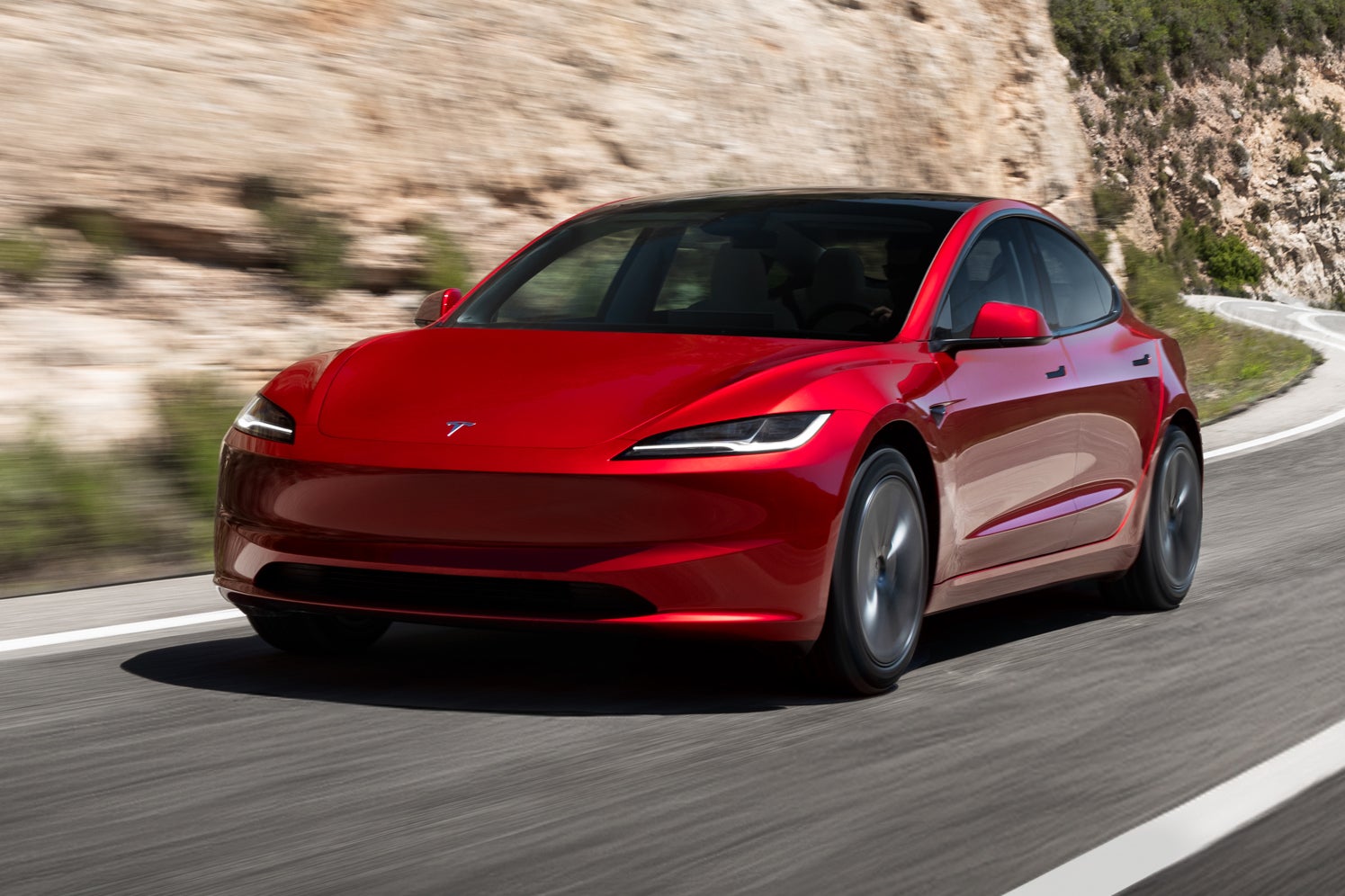Tesla Model 3 Review 2024
Written by Richard Aucock
Quick overview
Pros
- Great range
- Digital functionality
- Facelift updates really enhance its appeal
Cons
- Reliance on touchscreen – and no indicator stalk
- No Apple CarPlay or Android Auto
- Car insurance can be expensive
Overall verdict on the Tesla Model 3
"The Tesla Model 3 is one of the most well-recognised electric cars on the road. It is also one of the most well-rounded, particularly in this facelifted guise which fixes some of the grumbles of the original model and adds renewed appeal to Tesla’s electric BMW 3 Series challenger."
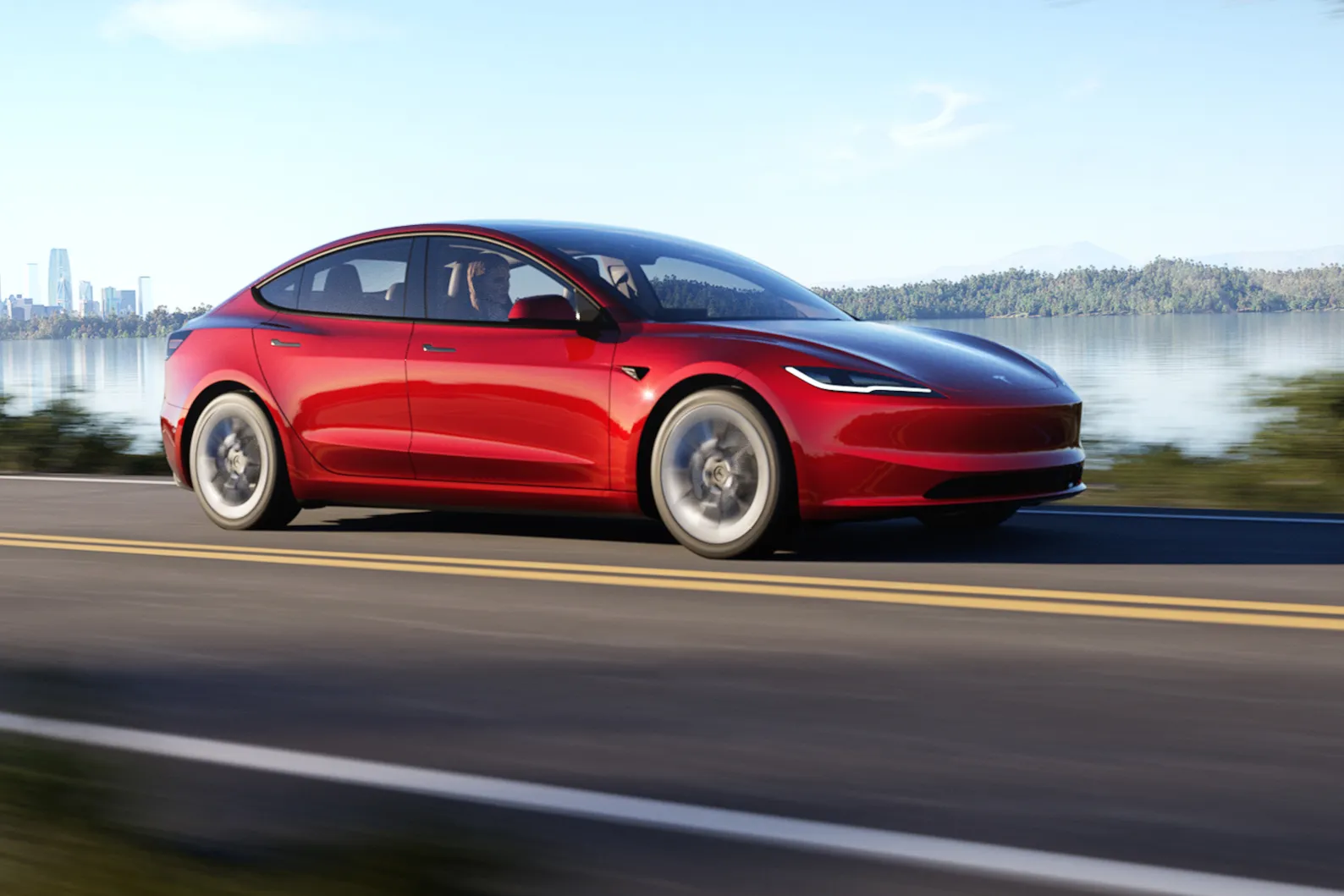
The Tesla Model 3 is a well-known electric car that has been one of the UK’s most popular EVs for several years now. A global best-seller, Tesla has long offered a simple model line-up – and this straightforwardness has proven no barrier to its overall popularity.
But competition in the EV sector is hotting up, with accomplished new models arriving all the time. So, in response to talented models such as the BMW i4, Volkswagen ID.7 and Polestar 2, Tesla has given the Model 3 a far-reaching facelift. The aim is to keep all the strengths of the original, while fixing some of the longstanding criticisms of the four-door EV.
The 2024 Tesla Model 3 has redesigned styling that gives it a sleeker look. The profile remains the same, but the details have changed. At the front, the headlights are slimmer and now feature a full-length LED light strip. At the rear, new C-shaped LED tail lamps look more modern. There’s also new ‘TESLA’ lettering on the bootlid, along with the availability of two (expensive) new colours.
The biggest updates for the 2024 Tesla Model 3 are found inside. The interior sees greater use of higher-quality materials, including real aluminium trim strips. The centre console has been redesigned, with the fingerprint-magnet gloss black replaced by an aluminium-covered console. There are all-new seats too, with both heating and cooling as standard.
Mechanically, the Tesla Model 3 is the same, but more efficient aerodynamics and ongoing tweaks to the battery and motors mean it eeks out even more miles of range. And extensive tuning to the suspension aim to improve the ride quality and refinement. Overall, the updates for the 2024 Tesla Model 3 are extensive and help turn it into a much more appealing EV. Read on to find out more.
heycar has 1000s of used cars for sale, including a wide range of Tesla Model 3s for sale.
Is the Tesla Model 3 right for you?
The Tesla Model 3 is a very convincing electric car. It has long sold very well here in the UK, and for the many thousands of owners, this facelifted version has a surprisingly comprehensive suite of updates that will make upgrading well worth it. The Tesla Model 3 is, for now, a fresher car than the alternative Telsa Model Y, which will interest those keen to drive the latest thing.
While the Tesla Model 3 is a family-sized car, and a very interesting EV alternative to a BMW 3 Series, one aspect may prove a bit awkward for families – its saloon boot. Not only does it lack the hatchback of the Tesla Model Y, the opening itself is also small, meaning you almost have to slot loads in rather than drop them in. This is worth considering if you’re weighing up the Model 3 vs the Model Y.
The bargain of the Tesla Model 3 range is the regular Rear-Wheel Drive version. Even this has a 344-mile range, yet costs a very competitive £39,990. If you’re after the biggest Tesla Model 3 bargain, the Rear-Wheel Drive gets our vote.
However, if you prefer the security of a longer range, the Tesla Model 3 Long Range is the one to go for. Thanks to its larger battery, it has a range of up to 421 miles. It does cost more, at £49,990, but you’ll struggle to find a car with a longer range for less. Oh, it also has the added benefit of all-wheel drive, for all-weather security.
The hot-rod of the line-up is the Tesla Model 3 Performance. This too has all-wheel drive – and the small matter of 460PS. This gives 0-60mph acceleration in just 2.9 seconds, along with a range of 328 miles. It costs £59,990 and is the best choice for those who want a Tesla that will beat Porsches and McLarens.
What other cars are similar to the Tesla Model 3?
The Tesla Model 3 is facing a growing range of rivals, as competitors cotton on to its market-friendly appeal. One recent arrival, the BYD Seal, really is a direct competitor, with a style that pays homage to the sleek Tesla, and with a glowing range of onboard tech all of its own.
More conventional alternatives include the BMW i4, a car that is very popular amongst company car drivers. The Volkswagen ID.7 is a more recent addition and is easily the brand’s best electric car yet. It’s bigger than the Tesla and BMW inside, too – although prices are more in line with the i4 than the entry-level Model 3.
The Polestar 2 is an established alternative to the Tesla Model 3, and it too was updated a little while back, with bigger batteries delivering a better range. Other similar cars to the Tesla Model 3 include the aero-look Hyundai Ioniq 6 and the Ford Mustang Mach-e.
Comfort and design: Tesla Model 3 interior
"The Tesla Model 3 facelift has bought a series of useful upgrades to the interior, that really help enhance its premium feel. However, the controversial removal of the indicator stalk will take some getting used to."
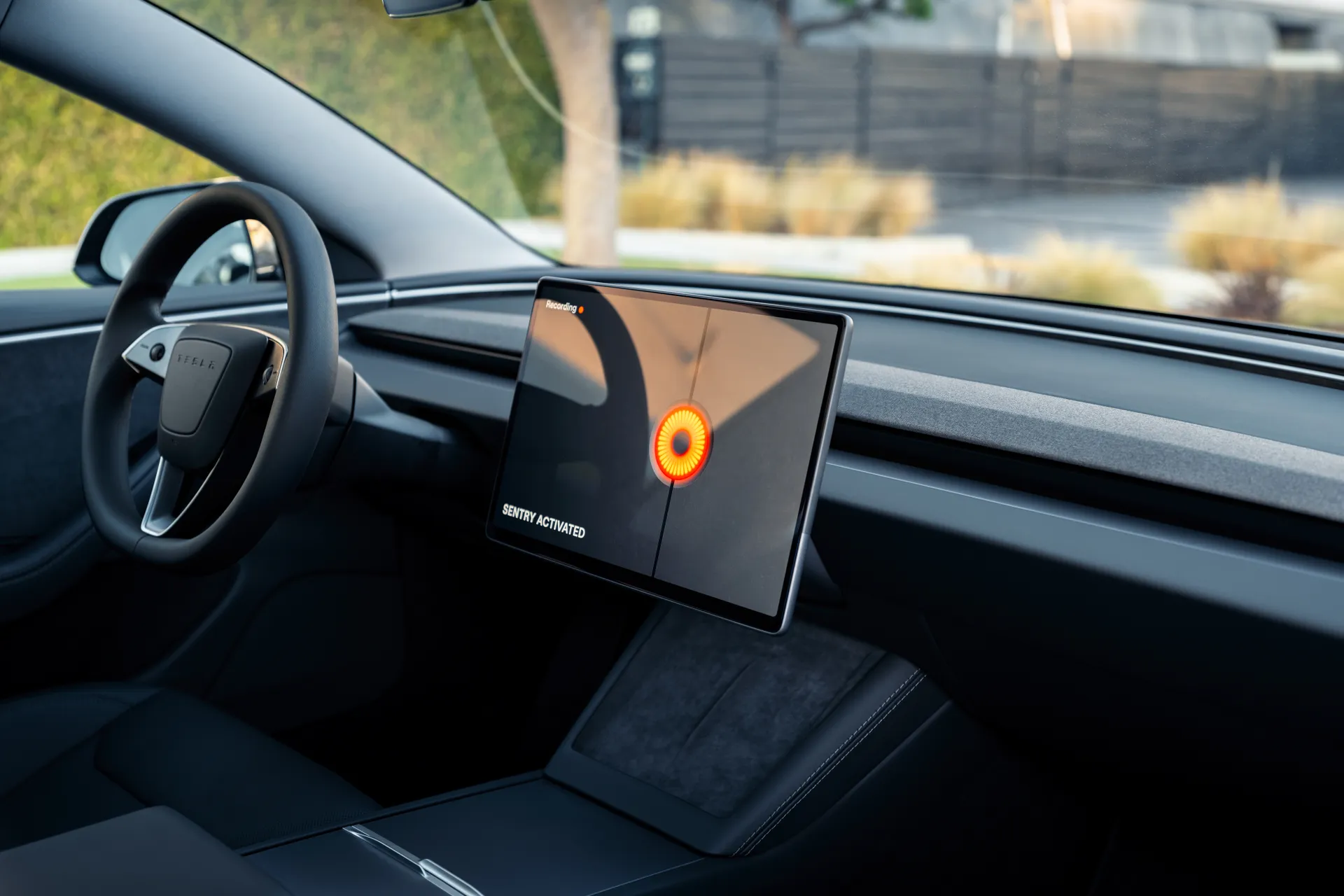
The Tesla Model 3’s famously minimalist interior has been paired back even further for the facelift. The single screen in the centre of the dash remains, but it now packs in even more functions, as Tesla has controversially removed the column stalks from behind the wheel – yes, both indicator stalk and gearshifter.
To indicate in a Tesla Model 3, you now press a button on the left-hand steering wheel spoke. The upper button is to indicate right, and the lower is for left. The theory is that you use your thumb, but it is hard to distinguish left from right without looking at them – and even harder to hit the button in the right place to not get a ‘false positive’ click.
With time, they become easier to use (muscle memory is a great thing), but it takes many miles for them to become intuitive. At least one clever feature helps out, though – they auto-cancel when a lane change is complete, which should make motorway driving easier. How about wipers? They’re automatic, with extra settings through the touchscreen, and there’s a wash-wiper button on the steering wheel.
We mentioned the gearshift column stalk has gone too. To select ‘D’ and ‘R’, you press the brake pedal and slide your finger up and down the central touchscreen. This too is not very intuitive at first, but Tesla is experimenting with clever ‘autoshift out of park’ functionality that can partly automate it. We shall see.
Other core features of the Tesla Model 3 interior remain, such as the huge panoramic glass roof that stretches far behind rear occupants’ heads. The frameless doors are also stylish, and newly-integrated ambient lighting adds a welcoming feel at night.
The Tesla Model 3 has redesigned seats that notably improve comfort. They are more supportive and you now feel like you’re sitting ‘in’ them rather than perched ‘on’ them. The new front seats are also ventilated, while both front and rear seats are heated as standard.
Quality and finish
One of the highlights of the Tesla Model 3 facelift is a big improvement in interior quality. It now feels like a far more premium-finish machine, with nicer surfaces and plusher touches. The difference between this and the pre-facelift model is striking.
Tesla Model 3 quality and finish highlights include a much-improved steering wheel that’s nicer to hold, the rich and super-smooth seat upholstery, nicely-padded doorhandles and greater use of soft-touch plastics throughout the interior. Even the door panels are fully finished in soft-touch trim.
There is greater attention to detail as well. Tesla has included real aluminium trim throughout the interior, to add a sparkling touch of quality. That ambient lighting makes it feel a warmer and more modern place at night too.
Infotainment: Touchscreen, USB, sat nav and stereo in the Tesla Model 3
The Tesla Model 3 famously has just a single screen inside, centrally located and using a landscape format rather than the portrait-style screen of earlier models. While the 15.4-inch screen is the same size overall as before, Tesla says a thinner bezel gives more usable screen area (and a more modern look).
Everything is centralised in the touchscreen, from climate control, to lights, even to adjusting the door mirrors. It can be a bit daunting, but it’s a trend increasingly followed by other car brands. Tesla does try to make it fairly intuitive too, with less reliance on multiple sub-menus. Of course, as there’s no display in front of the driver, the speedo is in the top right corner of the screen, along with other warning lights. You must get used to looking left to check your speed, rather than down in front of you.
The one glaring Tesla Model 3 omission remains a lack of Apple CarPlay or Android Auto smartphone connectivity. You have to use regular Bluetooth to connect with your phone instead, which is less user-friendly.
Tesla uses its own sat nav system, overlayed onto Google Maps mapping. You can choose either satellite or street view. It’s a superb system because it automatically integrates with the Tesla Supercharger network. If your journey is longer than the car’s remaining range, it will automatically include Superchargers on the route, in the most efficient way possible.
The Tesla Model 3 sat nav also accurately shows the predicted range remaining at the end of a journey. This is updated in real time – so if you don’t quite have enough battery to reach your destination, you can choose to drive a bit slower and watch the range move from negative to positive. You can also send destinations to the car by using the Tesla smartphone app.
Tesla has redesigned the centre console below the touchscreen in the new Model 3. It includes dual wireless smartphone chargers – and there is also a USB-C charging port. There are two more USB-C charging ports in the rear, each delivering 65W of power.
There’s a surprise in the rear of the new Tesla Model 3 too – an additional 8.0-inch touchscreen display. This allows passengers to control climate in the rear, and it also includes entertainment features such as YouTube. Tesla says over-the-air updates will add more content to this screen in the future. There’s nothing else quite like it in this price bracket.
The Tesla Model 3 Rear-Wheel Drive has a nine-speaker stereo with a subwoofer and amplifier. The Tesla Model 3 Long Range has an enhanced 17-speaker stereo with dual subwoofers and dual amplifiers. Native apps for Spotify, Apple Music and Tidal mean you can sign in and access your playlists through the touchscreen.
Space and practicality: Tesla Model 3 boot space
The Tesla Model 3 feels like a spacious car in the front. There is plenty of seat adjustment, and the open plan dashboard enhances the feeling of roominess. The light and airy sensation is further underlined by the full glass roof (it’s coated to protect from UV rays) – and a windscreen that drops down really low to give enhanced visibility out the front. Such a low bonnet line gives you a great view of the road ahead, and is one of the unique aspects of the Tesla Model 3.
Rear space is OK, but it could be better. The floor is a bit high, which means your knees will be a bit perched. There’s not much space under the front seat for big feet, and while adults can still get in without too much of a squeeze, it can feel a bit cramped on longer trips. At least the panoramic roof adds an airy feel – it stretches far backwards from the central bar (which contains LED reading lights) which, again, gives a unique sensation.
The Tesla Model 3 has a 594-litre boot, which is a very good size for the sector. However, it has a saloon car boot opening, rather than a hatchback, and the opening itself is rather shallow. This means you have to bend down and feed items in if you want to use the full capacity of the boot.
There are some surprises in the Tesla Model 3’s boot, though. For starters, it’s surprisingly wide towards the rear, allowing you to load items right into the corners for easy access (the deep cubbies stop things sliding around, too). There’s also a really deep storage area beneath the boot floor, which is perfect for storing charging cables and more. The Tesla Model 3 also has a roomy front boot, or ‘frunk’, that again is deep and useful. It has an overall capacity of 88 litres, way bigger than many other ‘frunks’.
Handling and ride quality: What is the Tesla Model 3 like to drive?
"The Tesla Model 3 facelift has also transformed the way it drives, particularly in terms of ride comfort. The suspension is much more compliant and copes far better on Britain’s rough roads. It remains seriously fast, too."
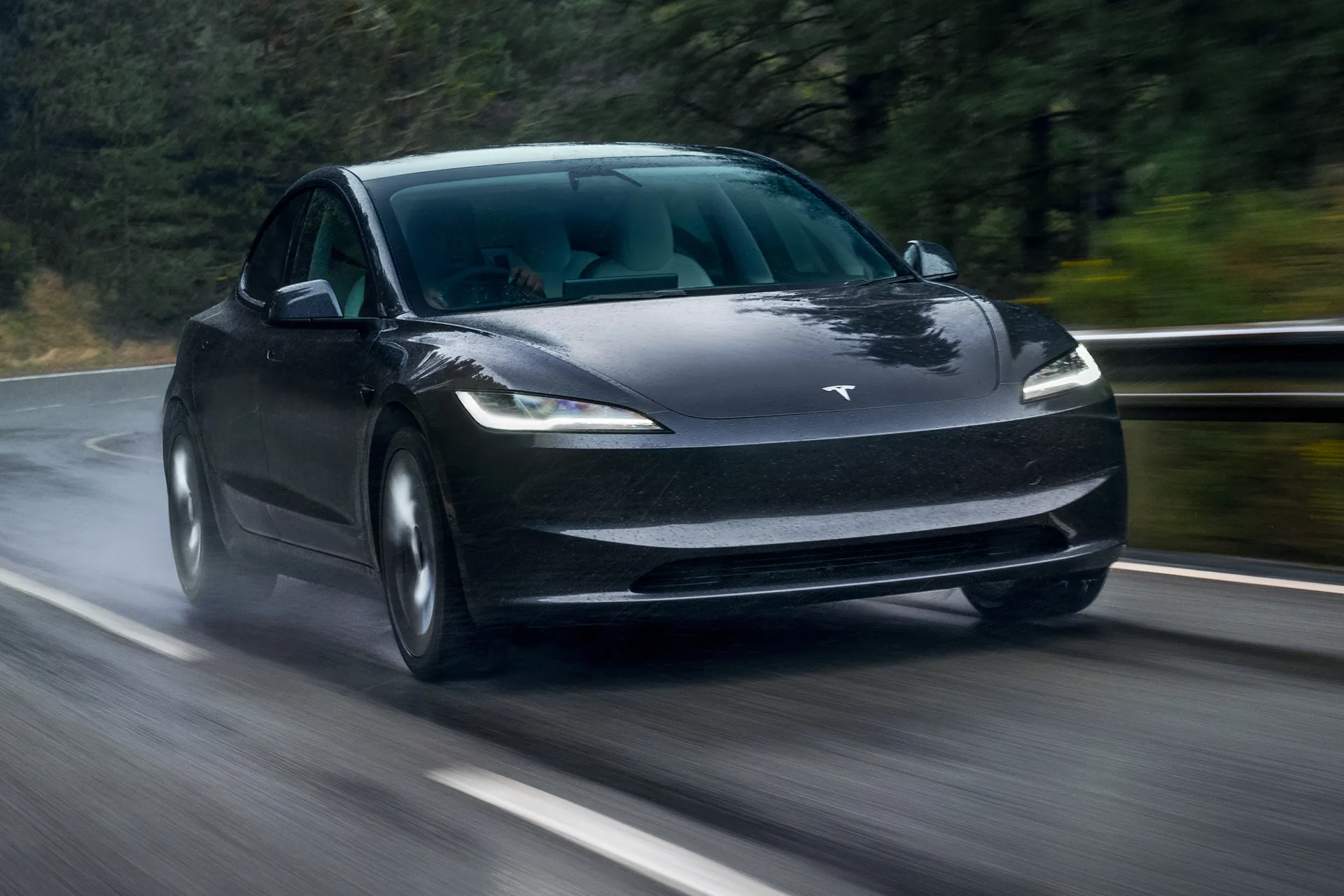
The latest Tesla Model 3 is a much better car to drive than the original version. Gone is the stiff, fidgety ride and nervous feel to the steering, with Tesla’s engineers giving it a full overhaul to bring the standards up to scratch.
The most obvious improvement is the ride quality. It is vastly more comfortable on British roads, absorbing bumps quietly rather than crashing over them with a thud. The stiff and frenetic feel of the old car has gone, and this newfound cushioned absorbency makes it a much more comfortable car for long trips.
The steering is also more natural, with a better feeling of accuracy. The old car lacked feel and the steering itself was too fast and darty. This new setup is far more measured, and gives the 2024 Tesla Model 3 more of a premium feel.
The Tesla Model 3 is agile through corners, too. Its platform is optimised as an EV, so weight can be kept in check and the centre of gravity is low. While it’s not as dynamic as a BMW i4, the improved drive of the new Tesla Model 3 will still be a welcome discovery – it’s a much nicer car to drive.
What engines and gearboxes are available in the Tesla Model 3?
The Tesla Model 3 offers a choice of three models, each with their own motor and battery configuration. The Tesla Model 3 Rear-Wheel Drive has a 245PS electric motor, which serves up 0-60mph in a speedy 5.8 seconds. Note, however, this is to 60mph, rather than the industry-standard 62mph.
The Tesla Model 3 Long Range has a dual motor setup for all-wheel drive. It produces 350PS and 0-60mph is even faster, at 4.2 seconds. The Tesla Model 3 Performance is indecently fast, with 460PS giving 0-62mph in just 2.9 seconds. It has a top speed of 163mph, whereas the other Tesla Model 3 have a 125mph top speed.
Tesla doesn’t disclose battery size. It is believed the Tesla Model 3 Rear-Wheel Drive has a 57.5kWh battery, for a range of up to 344 miles. The Long Range has a 75kWh battery, for a 421-mile range. The Model 3 Performance has a 78kWh battery and a 328-mile range.
All Tesla Model 3 are very efficient, making excellent use of the battery power. The Rear-Wheel Drive is best of all, and is capable of covering 4.7 miles for every kWh of battery charge.
A key benefit of the Tesla Model 3 is its ability to use the superb Tesla Supercharger network. These speedy chargers deliver lots of range in a short amount of time, and they work automatically – simply plug in and charging starts instantly. The sat nav easily shows nearby Supercharger locations on the move.
Refinement and noise levels
The new Tesla Model 3 is an even quieter car overall, with low levels of wind noise and good isolation from the road surface, even at speed. It has the quietness you’d expect of an EV, helped by double-glazed side windows and improved aerodynamics that help it slip through the air more quietly. It now has an ultra-low aerodynamic drag factor of 0.219.
The low levels of road noise are enhanced in town by good absorption from potholes. You now hardly hear the suspension working, and driving over bumps barely generates a dull thud, whereas before it would be more of an audible crash.
The full package of acoustic glass, improved seals and more sound-dampening materials deliver, says Tesla, a 30% improvement in wind noise, 20% less road noise, a 30% improvement in ambient noise isolation and 25% less impact noise improvement. These are all reasons old Tesla Model 3 drivers will be so impressed when they test-drive a new one.
Safety equipment: How safe is the Tesla Model 3?
The Tesla Model 3 was crash-tested by Euro NCAP back in 2019, where it achieved a five-star safety score. This latest model has updates beneath the surface to further improve its crash safety, while Tesla’s extensive driver assist system also help avoid accidents.
You can also choose so-called Full Self Driving on the Tesla Model 3. While it’s not yet anything of the sort, over the air updates will enhance self-driving functionality in the future. A cheaper option is Enhanced Autopilot, which offers additional driver support functionality. All Tesla Model 3 have standard Autopilot cruise control.
The Tesla Model 3 also has lots of cameras outside and in, to keep an eye both on the driver and the surroundings. You can even view the cameras remotely from a smartphone, so you can check if your Tesla is safe and secure while parked.
The new Tesla Model 3 adds a blind spot warning system. This is something that’s featured on other cars for years now, but is a new feature for Tesla. When a vehicle is detected in your blind spot, a little LED appears in the upper speaker grille.
MPG and fuel costs: What does a Tesla Model 3 cost to run?
"The Tesla Model 3 is a particularly efficient EV, meaning you’ll spend less on charging it. However, high insurance groups means you’ll probably be spending more on your annual premiums."
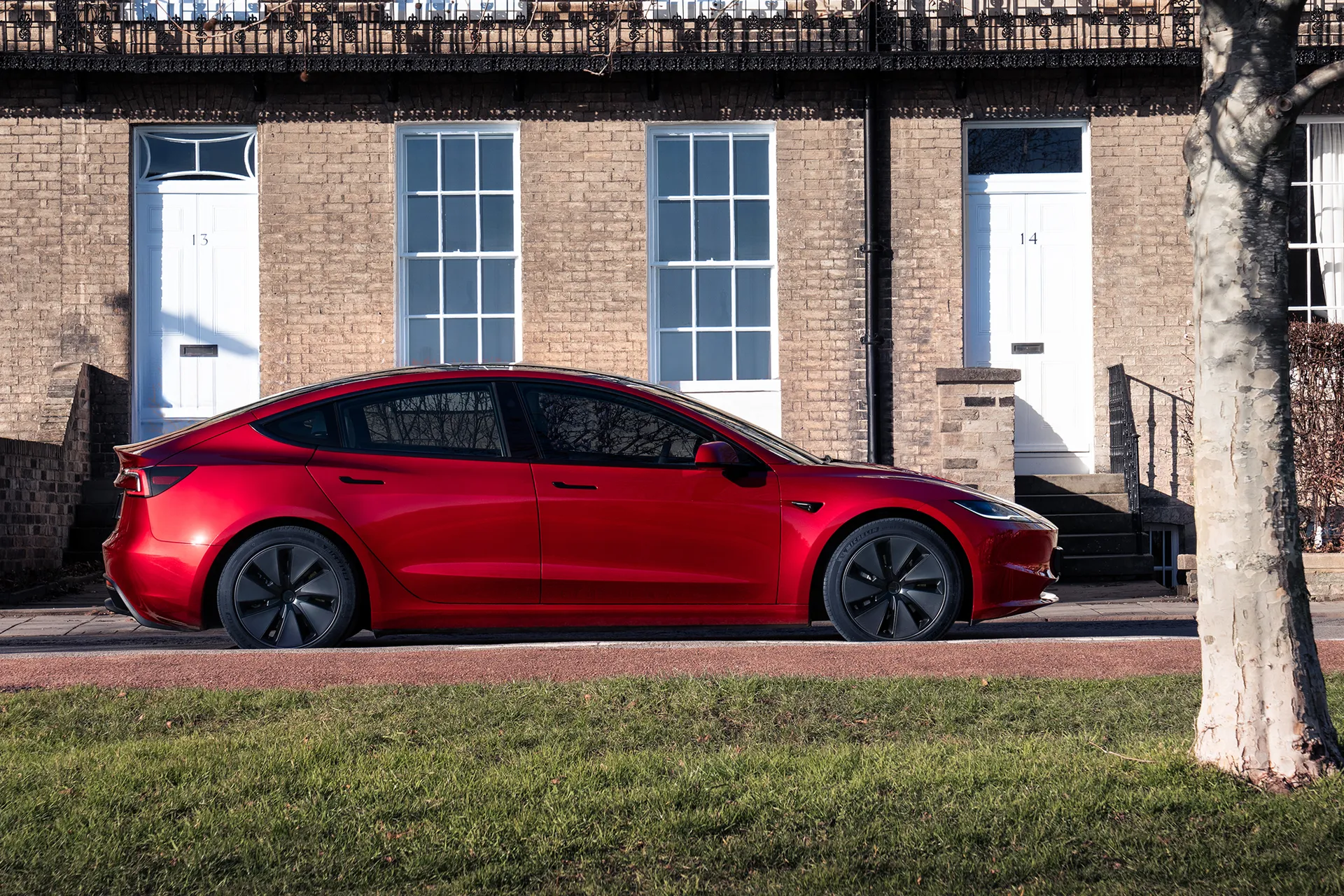
The Tesla Model 3 is a particularly efficient EV. Efficiency is measured in how many miles an EV travels for every kWh of electricity stored in the battery – and the most efficient Model 3 covers nearly five miles per kWh. This means every kWh you pay for goes further than in many of the Tesla Model 3’s rivals, which will help keen running costs in check.
If you have home charging, an electric car is cheaper to run than a petrol car anyway. While public charging is expensive for most EVs, Tesla owners get to use the Supercharger network – and there are membership schemes available to lower the price you pay for electricity. You can easily do this through the Tesla app.
Payments for Tesla Supercharging is also arranged automatically through the app. Unlike most other EVs, you don’t need to tap a card or open up the app to begin charging – you simply plug and go. This convenience is a major benefit of Tesla ownership.
Tesla Model 3 reliability and warranty
The Tesla Model 3 is proving to be a pretty reliable car. In ownership surveys, it is generally well-placed overall, with the only grumbles involving quality of the exterior and interior – something the 2024 revisions aim to put right.
Tesla’s batteries are also proving very robust and reliable. Even high-mileage models are retaining a good proportion of their original capacity, and issues seem very rare. This is backed up by an eight-year, 100,000-mile battery warranty and Tesla lets you pay to extend it further.
The standard new car warranty on a Tesla Model 3 is a generous four years, rather than the standard three years. However, it is only valid for 60,000 miles – it’s worth bearing this in mind if you’re a high-mileage driver. Again, you can pay to extend the warranty further.
Tesla Model 3 insurance groups and costs
The Tesla Model 3 is expensive to insure. Even the entry-level version has a group 48 car insurance rating, with the top-spec model going right up to the maximum group 50 rating. Tesla does, however, offer its own car insurance service, which could help keep costs in check.
VED car tax: What is the annual road tax on a Tesla Model 3?
The annual road tax on the Tesla Model 3 is, because it is an electric car, zero. It is also exempt from the London Congestion Charge.
However, the free VED road tax is currently scheduled to end in April 2025. This means that Tesla Model 3 drivers will pay £10 in the first year, then £165 in subsequent years. All but the base car, which costs £40,000, will also be required to pay the ‘expensive car’ supplement for the first five years.
Tesla Model 3 Price
"Tesla Model 3 prices start at £39,990 for the rear-wheel drive model, rising to £59,990 for the all-wheel drive performance model."
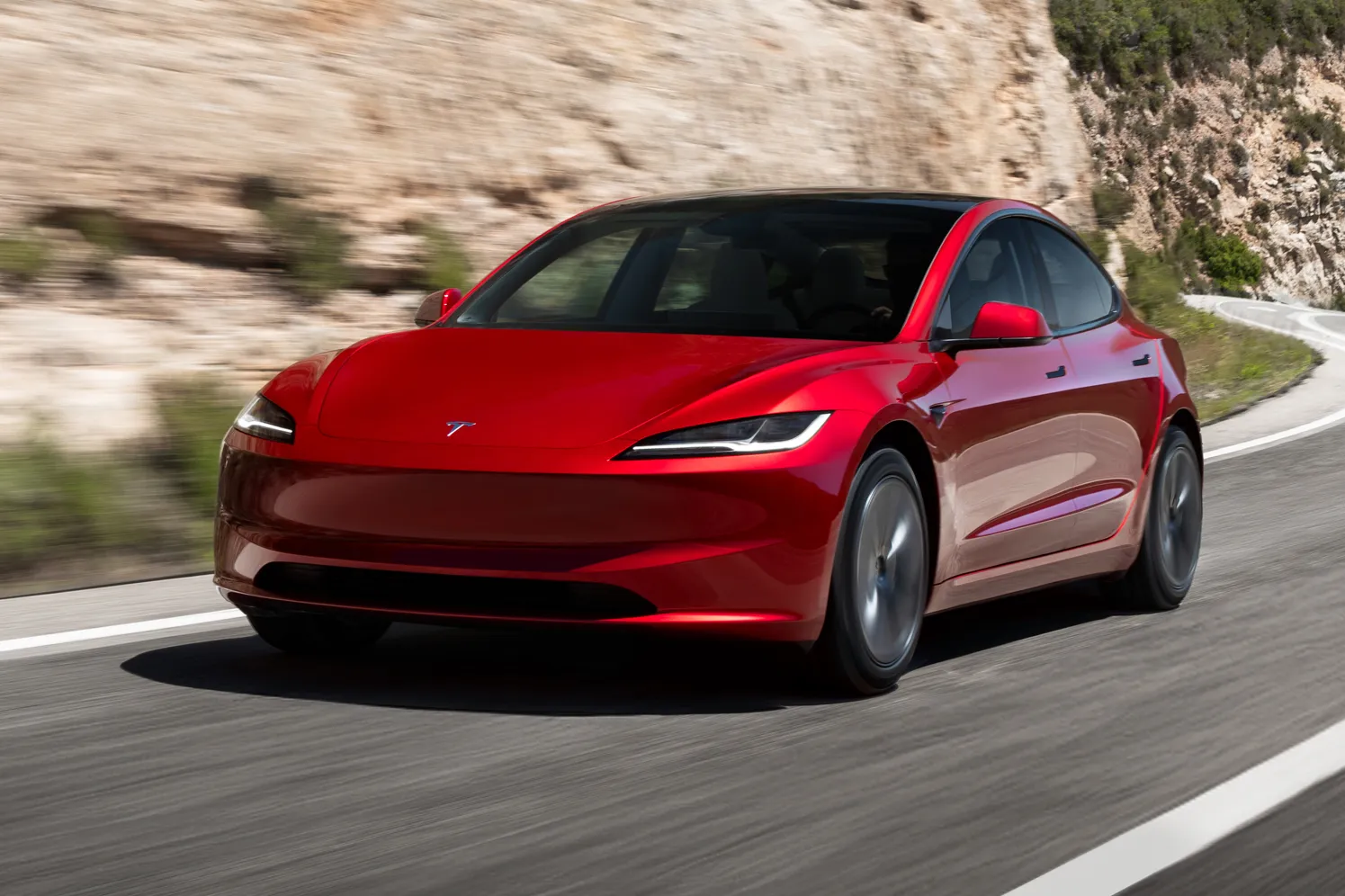
Tesla Model 3 prices are becoming very affordable indeed, helped by its new car popularity that means there’s a huge amount of choice on the used car market.
The Tesla Model 3 has proven to be a very popular car here in the UK since its launch in 2020. This means there are plenty of used Tesla Model 3 to choose from.
Here at heycar, you can currently pick up an early 2020 car from as little as £16,000, which seems striking value for money. The improved 2021 model – it has black doorhandles and window trim instead of the earlier car’s silver – can be picked up from around £20,000, and that’s the one that we would go for.
There are plenty of used Tesla Model 3 Long Range to choose from, so you needn’t have range anxiety. And while it is rarer, you can also find the Tesla Model 3 Performance on the used car market – it offers exceptional performance for the money.
Trim levels and standard equipment
All Tesla Model 3 are very well equipped as standard. The main differences are in the size of the battery and the setup of the electric motors – the same core standard equipment features across all three.
High-end features include the new front seats that have both heating and ventilation as standard. Heated seats in the rear are standard too, along with the rear passenger 8.0-inch display. As with the 15.4-inch touchscreen in the front, this will improve over time with free over the air updates.
As mentioned, all Tesla Model 3 have a crisp-sounding sound system that’s designed in-house. The Rear-Wheel Drive has nine speakers and a subwoofer, while the Long Range has 17 speakers and two subwoofers. The built-in Amazon Music and Spotify apps are standard too, as are gimmicks like the Tesla Arcade gaming app.
All Tesla Model 3 have standard acoustic glass, all-round electric windows, electric door mirrors and three-zone climate control. The array of cameras offers extensive coverage both outside and in, and the Tesla smartphone app is similarly comprehensive.
Standard models have 18-inch alloy wheels with, in Rear-Wheel Drive guise, a range of up to 344 miles. 19-inch wheels are optional, but do mean the range to drop down to 318 miles. It’s the same for the Long Range, with the 421-mile range on 18-inch wheels dropping to a still-creditable 390 miles on 19-inch wheels.
Tesla Model 3 Performance models have bespoke tuning and extra tech to help manage their colossal performance. This includes adaptive damping and a clever Track Model V3.
In terms of colours, the Tesla palette is limited to six. Only one colour, white, is free, with others costing £1300 or, in the case of new Stealth Grey and Ultra Red, a hefty £2000.
Ask the heycar experts: common questions
How can I tell a new Tesla Model 3 at a glance?
How do I open the door on a Tesla Model 3?
What is the EV range of a Tesla Model 3?
Tesla Model 3 Alternatives
Get our latest advice, news and offers
Keep me updated by email with the latest advice, news and offers from heycar.
By submitting you agree to our privacy policy
